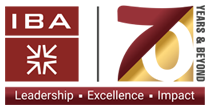IBA Karachi launches book on 'The State of Pakistan's Economy: During the Pandemic and Beyond 2021-22'
September 15, 2021: The Faculty members of the Department of Economics, School of Economics and Social Sciences (SESS), and the Center of Business and Economics Research (CBER) at the Institute of Business Administration (IBA) Karachi launched a book titled, The State of Pakistan's Economy: During the Pandemic and Beyond 2021-22. Following its tradition of the last two years, the faculty of the Department of Economics analyzed the state of Pakistan's economy in the backdrop of the federal budget 2021-22. The analyses culminated into a book which was launched at the IBA Karachi, Main Campus. Attendees included members from the academia, media, corporate sector, the IBA faculty, students and alumni.
The book was launched through a panel discussion featuring Dr. Mubarik Ahmed, Technical Specialist in Agricultural Policies; Dr. Waqar Masood Khan, former Advisor to the Prime Minister on Revenue; and Professor Dr. Samina Khalil, Director, Applied Economics Research Centre, University of Karachi. The panel discussion was moderated by Dr. S Akbar Zaidi, Executive Director, IBA Karachi and Dr. Asma Hyder, Dean, School of Economics and Social Sciences (SESS).
Dr. Zaidi welcomed the panelists and the guests and introduced the contents of the book. On the fiscal space he added that FBR met its targets due to devaluation of rupee and duties on import.
The co-moderator of the session, Dr. Hyder, shed light on the thought process behind the book by sharing that it was Dr. Zaidi's idea that the faculty of Economics Department should come forward in facilitating the government and policymakers for providing scholarly input on economic issues.
Dr. Waqar congratulated IBA's faculty on publishing the book which has insightful chapters. He further mentioned that people will await the publication if IBA publishes it periodically and in a timely manner.
The analyses presented in the book cover a broad range of aspects of Pakistan's macroeconomic policy. It presents the future landscape of the economy. It provides an assessment of the budget performance in 2020-21 and analyzes the outlook of fiscal policy for 2021-22. It discusses the State Bank of Pakistan's response to various demand and supply-side shocks during the last two decades.
Dr. Ahmed shared with the audience that the book rightly highlights that Pakistan's agricultural policies are in a primitive stage of development.
The book focuses on the prospects of regaining the trade competitiveness in the post-Covid-19 scenario and growth and trade prospects in view of the Business Confidence Index. It analyzes the sectoral issues related to construction, energy, and agriculture, respectively and the effects of Covid-19 on the labor market. It covers the state of education during the pandemic, the youth bulge, and opportunities. Lastly, it provides a snapshot of social protection in Pakistan in the wake of the pandemic.
Dr. Khalil underscored the need to include environmental and health economics in economic discussions.
The purpose of this publication is to provide scholarly input to various stakeholders, including but not limited to, policymakers, development practitioners, researchers, and the business community.

